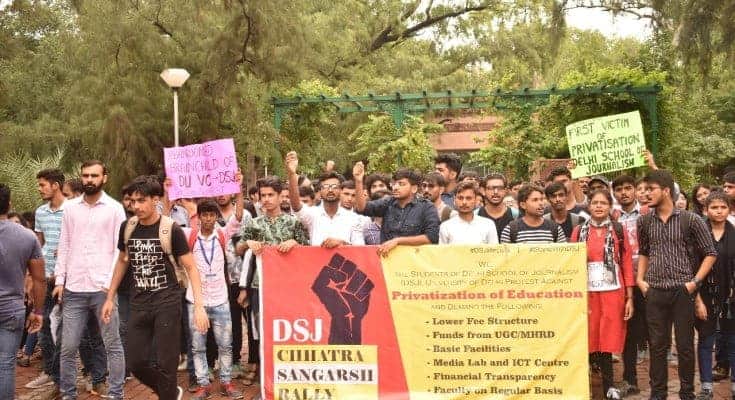As the opportunities in the service sector and manufacturing sector increased for the educated youth, the demand for educational institutions grew, and hence, education is turning into a business in our country.
In India, it is not legal to run educational institutions as business organisations, since only trusts can run such institutions on a non-profit basis. However, there appears to be a systemic method by which many trusts turn these non-profit institutions into their profit-making centres.
The entrepreneurs, taking advantage of the high demand for education, generally get land allotted at a nominal cost in the name of an educational community. In the initial stages, some temporary structures are put up. Later on, as students are admitted, funds begin to flow in the form of development fee, building fee, tuition fee, cultural event fee, etc. These institutions charge cost plus pricing for the services rendered by them. Therefore, over a period of time, these institutions were able to construct huge buildings and purchase costly equipment to modernise their establishments. In this way, a large percentage of unaided private schools and colleges have converted education into a business enterprise.
Earlier, these institutions were confined to metropolitan areas and big cities, but now they are spreading even to smaller towns. “This seriously undermines the selfless nature of education, especially in a country like ours where students are supposed to consider their teachers as Gods,” opined Bhavya, a first-year student pursuing B.A. (Honours) Economics from Daulat Ram College. Of late, the issue of charging capitation fee by educational institutions has also become a sensational topic of disccussion. The Supreme Court, in its judgement on the Mohini Jain versus the Government of Karnataka case in 1992, declared that the Right to Education was a fundamental right, and that the charging of capitation fee was arbitrary, unfair, and, therefore, in violation of the fundamental Right to Equality contained in Article 14 of the Constitution. Mohini Jain, the petitioner in the case, was admitted to the medical college in Karnataka, but she could not take advantage of admission as she could not pay INR 60,000 per year as capitation fee.
A distinction has to be made between privatisation and commercialisation of education. India has a long tradition of privatisation of higher education. Tilak, Karve, Sir Syed Ahmed Khan, and many other charitable trusts started educational institutions to widen educational opportunity in the society. But modern educational entrepreneurs are not guided by philanthropic motives of the earlier reformers. They intend to invest in educational institutions to maximise profits, because the demand for professional education is very high and the risk involved in this investment is minimal.
There have also been many instances of promoters of educational institutions getting involved in tax evasion and money laundering cases. Politicians and other investors create trust funds, citing education as the motive.
Corporate Social Responsibility funds flow into the trust through legitimate banking channels. These funds are returned to the promoters in cash, and the actual expenditure on the institution is met with the illicit hoard of black money. The expenditure is then inflated, helping launder the black money. In spite of these negative aspects, there are many positive aspects as well that have been brought in by the private investments in the education sector. They have filled up the investment deficit in the education sector. They have increased the availability of seats, creative subjects, and also developed the other centres including the urban areas.
Any development without proper regulations is hazardous for the society. Hence, there should be a strong regulatory body across India for the regulation of these institutions regularly. Benjamin Franklin wisely said, “An investment in knowledge pays the best interest.” One can sincerely hope the investment is not made to run education as a business to a point of extreme capitalistic individualism and exploitation, but in order to increase knowledge for the building of a stronger and a more reformed society.
Feature Image Credits: DU Beat Archives
Abhinandan Kaul




Comments are closed.